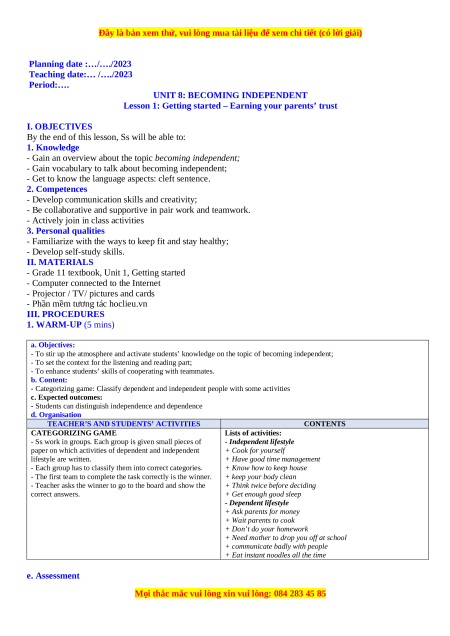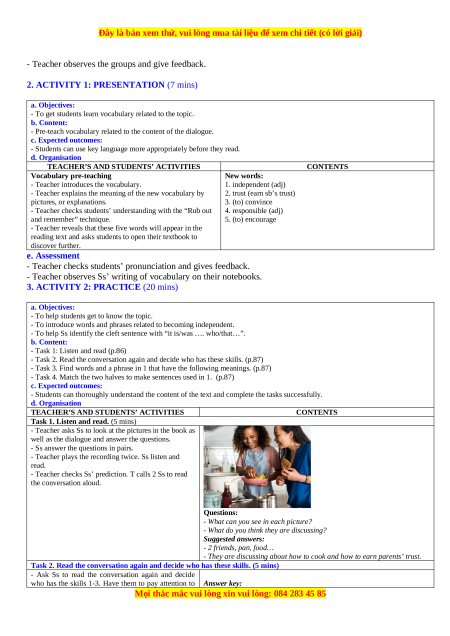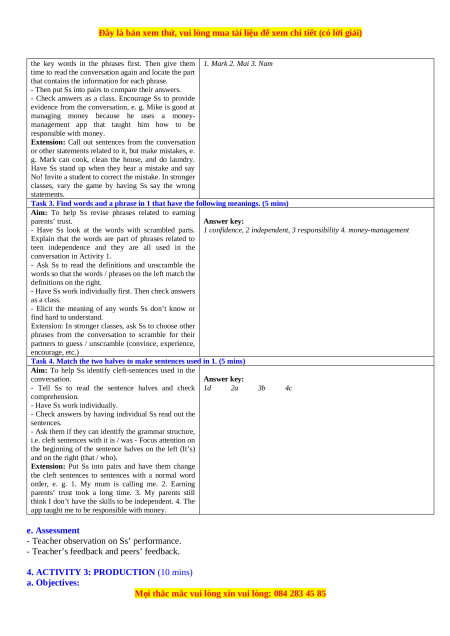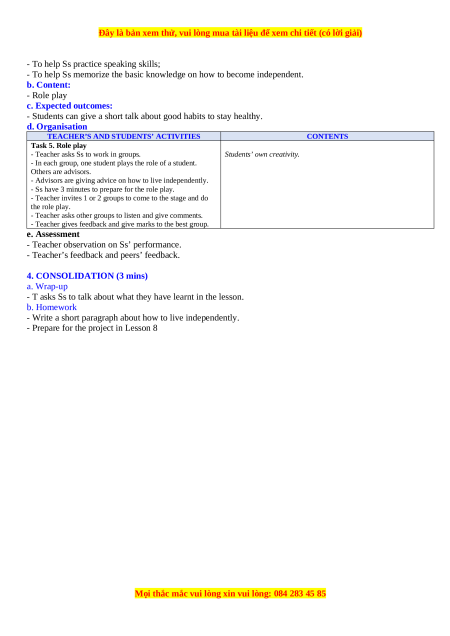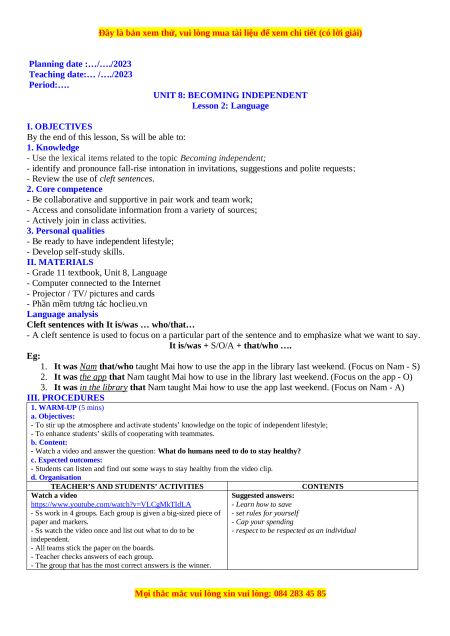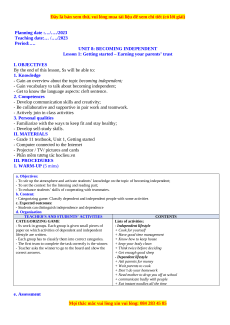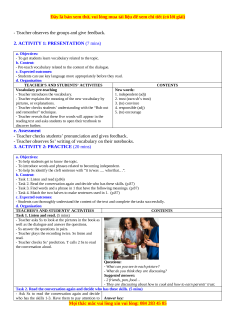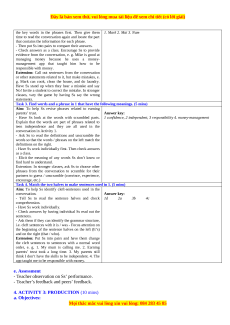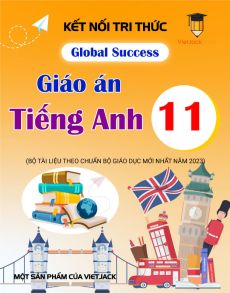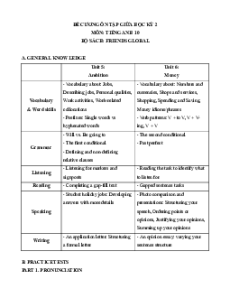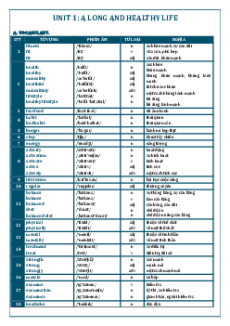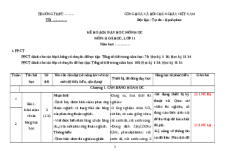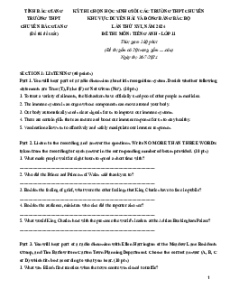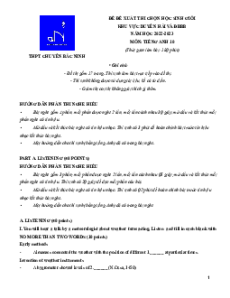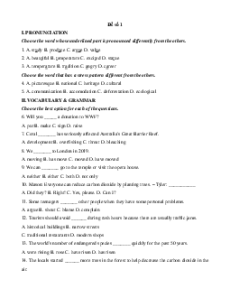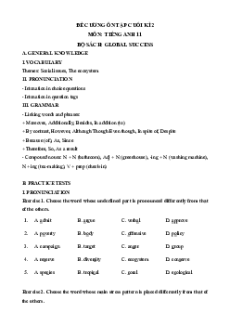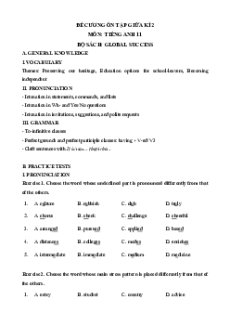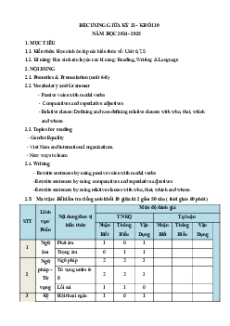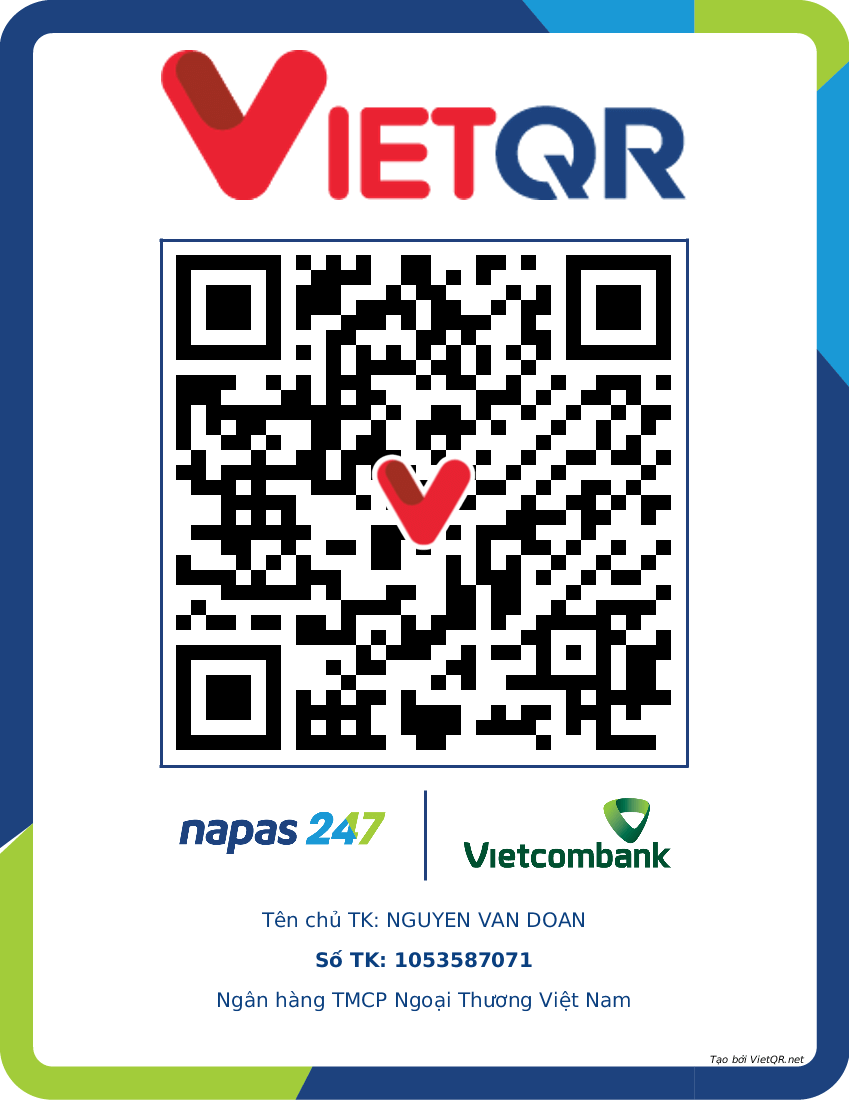Planning date :…/…./2023 Teaching date:… /…./2023 Period:….
UNIT 8: BECOMING INDEPENDENT
Lesson 1: Getting started – Earning your parents’ trust I. OBJECTIVES
By the end of this lesson, Ss will be able to: 1. Knowledge
- Gain an overview about the topic becoming independent;
- Gain vocabulary to talk about becoming independent;
- Get to know the language aspects: cleft sentence. 2. Competences
- Develop communication skills and creativity;
- Be collaborative and supportive in pair work and teamwork.
- Actively join in class activities 3. Personal qualities
- Familiarize with the ways to keep fit and stay healthy; - Develop self-study skills. II. MATERIALS
- Grade 11 textbook, Unit 1, Getting started
- Computer connected to the Internet
- Projector / TV/ pictures and cards
- Phần mềm tương tác hoclieu.vn III. PROCEDURES 1. WARM-UP (5 mins) a. Objectives:
- To stir up the atmosphere and activate students’ knowledge on the topic of becoming independent;
- To set the context for the listening and reading part;
- To enhance students’ skills of cooperating with teammates. b. Content:
- Categorizing game: Classify dependent and independent people with some activities c. Expected outcomes:
- Students can distinguish independence and dependence d. Organisation
TEACHER’S AND STUDENTS’ ACTIVITIES CONTENTS CATEGORIZING GAME Lists of activities:
- Ss work in groups. Each group is given small pieces of
- Independent lifestyle
paper on which activities of dependent and independent + Cook for yourself lifestyle are written.
+ Have good time management
- Each group has to classify them into correct categories.
+ Know how to keep house
- The first team to complete the task correctly is the winner. + keep your body clean
- Teacher asks the winner to go to the board and show the
+ Think twice before deciding correct answers. + Get enough good sleep - Dependent lifestyle + Ask parents for money + Wait parents to cook + Don’t do your homework
+ Need mother to drop you off at school
+ communicate badly with people
+ Eat instant noodles all the time e. Assessment
- Teacher observes the groups and give feedback.
2. ACTIVITY 1: PRESENTATION (7 mins) a. Objectives:
- To get students learn vocabulary related to the topic. b. Content:
- Pre-teach vocabulary related to the content of the dialogue. c. Expected outcomes:
- Students can use key language more appropriately before they read. d. Organisation
TEACHER’S AND STUDENTS’ ACTIVITIES CONTENTS Vocabulary pre-teaching New words:
- Teacher introduces the vocabulary. 1. independent (adj)
- Teacher explains the meaning of the new vocabulary by 2. trust (earn sb’s trust) pictures, or explanations. 3. (to) convince
- Teacher checks students’ understanding with the “Rub out 4. responsible (adj) and remember” technique. 5. (to) encourage
- Teacher reveals that these five words will appear in the
reading text and asks students to open their textbook to discover further. e. Assessment
- Teacher checks students’ pronunciation and gives feedback.
- Teacher observes Ss’ writing of vocabulary on their notebooks.
3. ACTIVITY 2: PRACTICE (20 mins) a. Objectives:
- To help students get to know the topic.
- To introduce words and phrases related to becoming independent.
- To help Ss identify the cleft sentence with “it is/was …. who/that…”. b. Content:
- Task 1: Listen and read (p.86)
- Task 2. Read the conversation again and decide who has these skills. (p.87)
- Task 3. Find words and a phrase in 1 that have the following meanings. (p.87)
- Task 4. Match the two halves to make sentences used in 1. (p.87) c. Expected outcomes:
- Students can thoroughly understand the content of the text and complete the tasks successfully. d. Organisation
TEACHER’S AND STUDENTS’ ACTIVITIES CONTENTS
Task 1. Listen and read. (5 mins)
- Teacher asks Ss to look at the pictures in the book as
well as the dialogue and answer the questions.
- Ss answer the questions in pairs.
- Teacher plays the recording twice. Ss listen and read.
- Teacher checks Ss’ prediction. T calls 2 Ss to read the conversation aloud. Questions:
- What can you see in each picture?
- What do you think they are discussing? Suggested answers: - 2 friends, pan, food…
- They are discussing about how to cook and how to earn parents’ trust.
Task 2. Read the conversation again and decide who has these skills. (5 mins)
- Ask Ss to read the conversation again and decide
who has the skills 1-3. Have them to pay attention to Answer key:
the key words in the phrases first. Then give them 1. Mark 2. Mai 3. Nam
time to read the conversation again and locate the part
that contains the information for each phrase.
- Then put Ss into pairs to compare their answers.
- Check answers as a class. Encourage Ss to provide
evidence from the conversation, e. g. Mike is good at
managing money because he uses a money-
management app that taught him how to be responsible with money.
Extension: Call out sentences from the conversation
or other statements related to it, but make mistakes, e.
g. Mark can cook, clean the house, and do laundry.
Have Ss stand up when they hear a mistake and say
No! Invite a student to correct the mistake. In stronger
classes, vary the game by having Ss say the wrong statements.
Task 3. Find words and a phrase in 1 that have the following meanings. (5 mins)
Aim: To help Ss revise phrases related to earning parents’ trust. Answer key:
- Have Ss look at the words with scrambled parts. 1 confidence, 2 independent, 3 responsibility 4. money-management
Explain that the words are part of phrases related to
teen independence and they are all used in the conversation in Activity 1.
- Ask Ss to read the definitions and unscramble the
words so that the words / phrases on the left match the definitions on the right.
- Have Ss work individually first. Then check answers as a class.
- Elicit the meaning of any words Ss don’t know or find hard to understand.
Extension: In stronger classes, ask Ss to choose other
phrases from the conversation to scramble for their
partners to guess / unscramble (convince, experience, encourage, etc.)
Task 4. Match the two halves to make sentences used in 1. (5 mins)
Aim: To help Ss identify cleft-sentences used in the conversation. Answer key:
- Tell Ss to read the sentence halves and check 1d 2a 3b 4c comprehension. - Have Ss work individually.
- Check answers by having individual Ss read out the sentences.
- Ask them if they can identify the grammar structure,
i.e. cleft sentences with it is / was - Focus attention on
the beginning of the sentence halves on the left (It’s) and on the right (that / who).
Extension: Put Ss into pairs and have them change
the cleft sentences to sentences with a normal word
order, e. g. 1. My mum is calling me. 2. Earning
parents’ trust took a long time. 3. My parents still
think I don’t have the skills to be independent. 4. The
app taught me to be responsible with money. e. Assessment
- Teacher observation on Ss’ performance.
- Teacher’s feedback and peers’ feedback.
4. ACTIVITY 3: PRODUCTION (10 mins) a. Objectives:
- To help Ss practice speaking skills;
- To help Ss memorize the basic knowledge on how to become independent. b. Content: - Role play c. Expected outcomes:
- Students can give a short talk about good habits to stay healthy. d. Organisation
TEACHER’S AND STUDENTS’ ACTIVITIES CONTENTS Task 5. Role play
- Teacher asks Ss to work in groups.
Students’ own creativity.
- In each group, one student plays the role of a student. Others are advisors.
- Advisors are giving advice on how to live independently.
- Ss have 3 minutes to prepare for the role play.
- Teacher invites 1 or 2 groups to come to the stage and do the role play.
- Teacher asks other groups to listen and give comments.
- Teacher gives feedback and give marks to the best group. e. Assessment
- Teacher observation on Ss’ performance.
- Teacher’s feedback and peers’ feedback. 4. CONSOLIDATION (3 mins) a. Wrap-up
- T asks Ss to talk about what they have learnt in the lesson. b. Homework
- Write a short paragraph about how to live independently.
- Prepare for the project in Lesson 8
Giáo án Unit 8: Becoming independent Tiếng Anh 11 Global success
2 K
1 K lượt tải
MUA NGAY ĐỂ XEM TOÀN BỘ TÀI LIỆU
CÁCH MUA:
- B1: Gửi phí vào TK:
1133836868- CT TNHH DAU TU VA DV GD VIETJACK - Ngân hàng MB (QR) - B2: Nhắn tin tới Zalo VietJack Official ( nhấn vào đây ) để xác nhận thanh toán và tải tài liệu - giáo án
Liên hệ ngay Hotline hỗ trợ: 084 283 45 85
Bộ giáo án Tiếng Anh 11 Global success được cập nhật liên tục trong gói này từ nay đến hết tháng 3/2024.
Để tải tài liệu gốc về máy bạn click vào nút Tải Xuống ở trên!
Thuộc bộ (mua theo bộ để tiết kiệm hơn):
- Bộ giáo án Tiếng Anh 11 Global success năm 2023 kèm mô tả ma trận đề kiểm tra và kế hoạch giảng dạy mới, chuẩn nhất được thiết kế theo phong cách hiện đại, đẹp mắt, trình bày chi tiết cho từng bài học và bám sát chương trình Sách giáo khoa Tiếng Anh 11 Kết nối tri thức.
- Mua trọn bộ sẽ tiết kiệm hơn tải lẻ 50%.
Đánh giá
4.6 / 5(2027 )5
4
3
2
1
Trọng Bình
Tài liệu hay
Giúp ích cho tôi rất nhiều
Duy Trần
Tài liệu chuẩn
Rất thích tài liệu bên VJ soạn (bám sát chương trình dạy)
TÀI LIỆU BỘ BÁN CHẠY MÔN Tiếng Anh
Xem thêmTÀI LIỆU BỘ BÁN CHẠY Lớp 11
Xem thêmTài liệu bộ mới nhất

Đây là bản xem thử, vui lòng mua tài liệu để xem chi tiết (có lời giải)
Planning date :…/…./2023
Teaching date:… /…./2023
Period:….
UNIT 8: BECOMING INDEPENDENT
Lesson 1: Getting started – Earning your parents’ trust
I. OBJECTIVES
By the end of this lesson, Ss will be able to:
1. Knowledge
- Gain an overview about the topic becoming independent;
- Gain vocabulary to talk about becoming independent;
- Get to know the language aspects: cleft sentence.
2. Competences
- Develop communication skills and creativity;
- Be collaborative and supportive in pair work and teamwork.
- Actively join in class activities
3. Personal qualities
- Familiarize with the ways to keep fit and stay healthy;
- Develop self-study skills.
II. MATERIALS
- Grade 11 textbook, Unit 1, Getting started
- Computer connected to the Internet
- Projector / TV/ pictures and cards
- Phần mềm tương tác hoclieu.vn
III. PROCEDURES
1. WARM-UP (5 mins)
a. Objectives:
- To stir up the atmosphere and activate students’ knowledge on the topic of becoming independent;
- To set the context for the listening and reading part;
- To enhance students’ skills of cooperating with teammates.
b. Content:
- Categorizing game: Classify dependent and independent people with some activities
c. Expected outcomes:
- Students can distinguish independence and dependence
d. Organisation
TEACHER’S AND STUDENTS’ ACTIVITIES CONTENTS
CATEGORIZING GAME
- Ss work in groups. Each group is given small pieces of
paper on which activities of dependent and independent
lifestyle are written.
- Each group has to classify them into correct categories.
- The first team to complete the task correctly is the winner.
- Teacher asks the winner to go to the board and show the
correct answers.
Lists of activities:
- Independent lifestyle
+ Cook for yourself
+ Have good time management
+ Know how to keep house
+ keep your body clean
+ Think twice before deciding
+ Get enough good sleep
- Dependent lifestyle
+ Ask parents for money
+ Wait parents to cook
+ Don’t do your homework
+ Need mother to drop you off at school
+ communicate badly with people
+ Eat instant noodles all the time
e. Assessment
Mọi thắc mắc vui lòng xin vui lòng: 084 283 45 85

Đây là bản xem thử, vui lòng mua tài liệu để xem chi tiết (có lời giải)
- Teacher observes the groups and give feedback.
2. ACTIVITY 1: PRESENTATION (7 mins)
a. Objectives:
- To get students learn vocabulary related to the topic.
b. Content:
- Pre-teach vocabulary related to the content of the dialogue.
c. Expected outcomes:
- Students can use key language more appropriately before they read.
d. Organisation
TEACHER’S AND STUDENTS’ ACTIVITIES CONTENTS
Vocabulary pre-teaching
- Teacher introduces the vocabulary.
- Teacher explains the meaning of the new vocabulary by
pictures, or explanations.
- Teacher checks students’ understanding with the “Rub out
and remember” technique.
- Teacher reveals that these five words will appear in the
reading text and asks students to open their textbook to
discover further.
New words:
1. independent (adj)
2. trust (earn sb’s trust)
3. (to) convince
4. responsible (adj)
5. (to) encourage
e. Assessment
- Teacher checks students’ pronunciation and gives feedback.
- Teacher observes Ss’ writing of vocabulary on their notebooks.
3. ACTIVITY 2: PRACTICE (20 mins)
a. Objectives:
- To help students get to know the topic.
- To introduce words and phrases related to becoming independent.
- To help Ss identify the cleft sentence with “it is/was …. who/that…”.
b. Content:
- Task 1: Listen and read (p.86)
- Task 2. Read the conversation again and decide who has these skills. (p.87)
- Task 3. Find words and a phrase in 1 that have the following meanings. (p.87)
- Task 4. Match the two halves to make sentences used in 1. (p.87)
c. Expected outcomes:
- Students can thoroughly understand the content of the text and complete the tasks successfully.
d. Organisation
TEACHER’S AND STUDENTS’ ACTIVITIES CONTENTS
Task 1. Listen and read. (5 mins)
- Teacher asks Ss to look at the pictures in the book as
well as the dialogue and answer the questions.
- Ss answer the questions in pairs.
- Teacher plays the recording twice. Ss listen and
read.
- Teacher checks Ss’ prediction. T calls 2 Ss to read
the conversation aloud.
Questions:
- What can you see in each picture?
- What do you think they are discussing?
Suggested answers:
- 2 friends, pan, food…
- They are discussing about how to cook and how to earn parents’ trust.
Task 2. Read the conversation again and decide who has these skills. (5 mins)
- Ask Ss to read the conversation again and decide
who has the skills 1-3. Have them to pay attention to Answer key:
Mọi thắc mắc vui lòng xin vui lòng: 084 283 45 85

Đây là bản xem thử, vui lòng mua tài liệu để xem chi tiết (có lời giải)
the key words in the phrases first. Then give them
time to read the conversation again and locate the part
that contains the information for each phrase.
- Then put Ss into pairs to compare their answers.
- Check answers as a class. Encourage Ss to provide
evidence from the conversation, e. g. Mike is good at
managing money because he uses a money-
management app that taught him how to be
responsible with money.
Extension: Call out sentences from the conversation
or other statements related to it, but make mistakes, e.
g. Mark can cook, clean the house, and do laundry.
Have Ss stand up when they hear a mistake and say
No! Invite a student to correct the mistake. In stronger
classes, vary the game by having Ss say the wrong
statements.
1. Mark 2. Mai 3. Nam
Task 3. Find words and a phrase in 1 that have the following meanings. (5 mins)
Aim: To help Ss revise phrases related to earning
parents’ trust.
- Have Ss look at the words with scrambled parts.
Explain that the words are part of phrases related to
teen independence and they are all used in the
conversation in Activity 1.
- Ask Ss to read the definitions and unscramble the
words so that the words / phrases on the left match the
definitions on the right.
- Have Ss work individually first. Then check answers
as a class.
- Elicit the meaning of any words Ss don’t know or
find hard to understand.
Extension: In stronger classes, ask Ss to choose other
phrases from the conversation to scramble for their
partners to guess / unscramble (convince, experience,
encourage, etc.)
Answer key:
1 confidence, 2 independent, 3 responsibility 4. money-management
Task 4. Match the two halves to make sentences used in 1. (5 mins)
Aim: To help Ss identify cleft-sentences used in the
conversation.
- Tell Ss to read the sentence halves and check
comprehension.
- Have Ss work individually.
- Check answers by having individual Ss read out the
sentences.
- Ask them if they can identify the grammar structure,
i.e. cleft sentences with it is / was - Focus attention on
the beginning of the sentence halves on the left (It’s)
and on the right (that / who).
Extension: Put Ss into pairs and have them change
the cleft sentences to sentences with a normal word
order, e. g. 1. My mum is calling me. 2. Earning
parents’ trust took a long time. 3. My parents still
think I don’t have the skills to be independent. 4. The
app taught me to be responsible with money.
Answer key:
1d 2a 3b 4c
e. Assessment
- Teacher observation on Ss’ performance.
- Teacher’s feedback and peers’ feedback.
4. ACTIVITY 3: PRODUCTION (10 mins)
a. Objectives:
Mọi thắc mắc vui lòng xin vui lòng: 084 283 45 85

Đây là bản xem thử, vui lòng mua tài liệu để xem chi tiết (có lời giải)
- To help Ss practice speaking skills;
- To help Ss memorize the basic knowledge on how to become independent.
b. Content:
- Role play
c. Expected outcomes:
- Students can give a short talk about good habits to stay healthy.
d. Organisation
TEACHER’S AND STUDENTS’ ACTIVITIES CONTENTS
Task 5. Role play
- Teacher asks Ss to work in groups.
- In each group, one student plays the role of a student.
Others are advisors.
- Advisors are giving advice on how to live independently.
- Ss have 3 minutes to prepare for the role play.
- Teacher invites 1 or 2 groups to come to the stage and do
the role play.
- Teacher asks other groups to listen and give comments.
- Teacher gives feedback and give marks to the best group.
Students’ own creativity.
e. Assessment
- Teacher observation on Ss’ performance.
- Teacher’s feedback and peers’ feedback.
4. CONSOLIDATION (3 mins)
a. Wrap-up
- T asks Ss to talk about what they have learnt in the lesson.
b. Homework
- Write a short paragraph about how to live independently.
- Prepare for the project in Lesson 8
Mọi thắc mắc vui lòng xin vui lòng: 084 283 45 85

Đây là bản xem thử, vui lòng mua tài liệu để xem chi tiết (có lời giải)
Planning date :…/…./2023
Teaching date:… /…./2023
Period:….
UNIT 8: BECOMING INDEPENDENT
Lesson 2: Language
I. OBJECTIVES
By the end of this lesson, Ss will be able to:
1. Knowledge
- Use the lexical items related to the topic Becoming independent;
- identify and pronounce fall-rise intonation in invitations, suggestions and polite requests;
- Review the use of cleft sentences.
2. Core competence
- Be collaborative and supportive in pair work and team work;
- Access and consolidate information from a variety of sources;
- Actively join in class activities.
3. Personal qualities
- Be ready to have independent lifestyle;
- Develop self-study skills.
II. MATERIALS
- Grade 11 textbook, Unit 8, Language
- Computer connected to the Internet
- Projector / TV/ pictures and cards
- Phần mềm tương tác hoclieu.vn
Language analysis
Cleft sentences with It is/was … who/that…
- A cleft sentence is used to focus on a particular part of the sentence and to emphasize what we want to say.
It is/was + S/O/A + that/who ….
Eg:
1. It was Nam that/who taught Mai how to use the app in the library last weekend. (Focus on Nam - S)
2. It was the app that Nam taught Mai how to use in the library last weekend. (Focus on the app - O)
3. It was in the library that Nam taught Mai how to use the app last weekend. (Focus on Nam - A)
III. PROCEDURES
1. WARM-UP (5 mins)
a. Objectives:
- To stir up the atmosphere and activate students’ knowledge on the topic of independent lifestyle;
- To enhance students’ skills of cooperating with teammates.
b. Content:
- Watch a video and answer the question: What do humans need to do to stay healthy?
c. Expected outcomes:
- Students can listen and find out some ways to stay healthy from the video clip.
d. Organisation
TEACHER’S AND STUDENTS’ ACTIVITIES CONTENTS
Watch a video
https://www.youtube.com/watch?v=VLCgMkTIdLA
- Ss work in 4 groups. Each group is given a big-sized piece of
paper and markers.
- Ss watch the video once and list out what to do to be
independent.
- All teams stick the paper on the boards.
- Teacher checks answers of each group.
- The group that has the most correct answers is the winner.
Suggested answers:
- Learn how to save
- set rules for yourself
- Cap your spending
- respect to be respected as an individual
Mọi thắc mắc vui lòng xin vui lòng: 084 283 45 85
